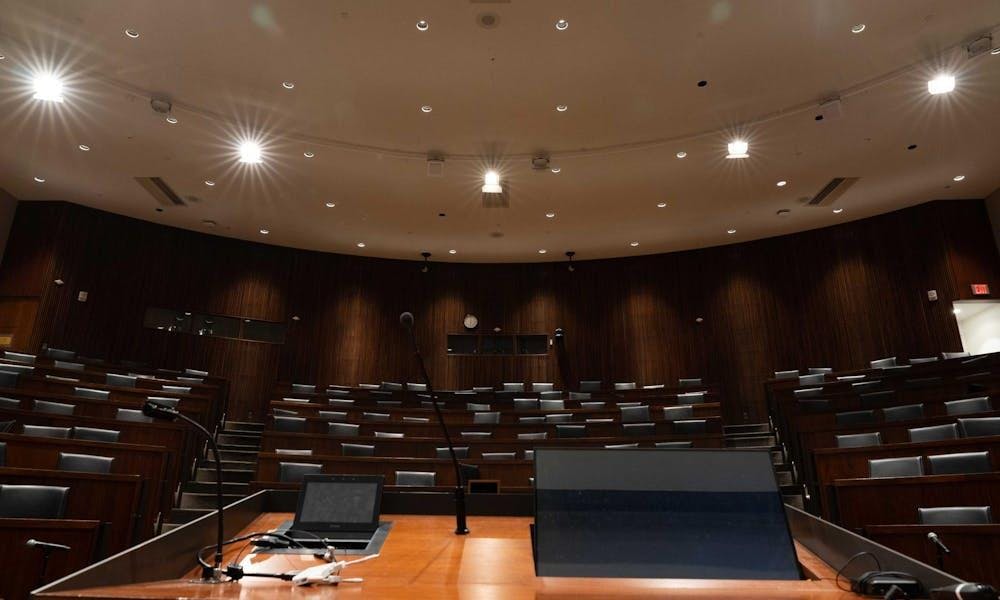Perhaps you noticed the flurry of posters and announcements circulating campus and social media this election cycle. Even if you had an 8:30 a.m. and shuffled to class with your eyes half shut, you couldn’t miss them: flyers taped to every lamppost and flooding every Instagram story, bearing fun slogans and flashy headshots and sometimes misplaced cultural references. Amid the noise, I saw candidates pledging to “extend late meal hours” and supporters of candidates suggesting lawn parties to be made grander.
Yet class council does not — and cannot — have a say in University policy. It has never had that authority. Indeed, Undergraduate Student Government’s (USG) mission statement defines the class council’s goal as to “foster community within each class.” Ostentatious campaign promises in this election reveal a fundamental lack of understanding of what class council does. Instead, we should campaign and vote for what the role actually entails — “fostering class community.”
The role of class council, then, is to act as a provisional class government until officer elections happen in the spring semester.
Though students may associate fostering community with bonding over longer late meal hours, the reality of what class council can do is much narrower. Promises like extended late meal are appealing because they touch on genuine student frustrations. And when frustrations run high, judgment becomes clouded and students jump on board with nearly anything, feasible or not.
But class council’s influence is limited to events and class-specific activities, like study breaks, socials, merch, and networking opportunities. Students looking for administrative change should direct their attention to the CPUC and student U-Councilors, who might have the authority and mediums to pursue it.
So why do people run for class council? Part of it is a genuine zeal for class cohesion — the opportunity to meaningfully shape the social life of yourself and those around you can be rewarding. But there are also other incentives: incumbency advantage for class officer elections in the spring, perceived social status that comes with the title of the office, or a resume line that they think sets them a cut above others.
This final point is especially consequential for first-years, who often feel pressure to distinguish themselves the second they get to campus. For many, it may feel as if accumulating commitments validates their place at Princeton. As Head Opinion Editor Frances Brogan ’27 wrote in her appeal to the freshman class, “you don’t have to cram your schedule with clubs just because it’s what you did in high school, or because it seems like everyone else is doing it.” The hyper-competitive mindset typical of Princeton first-years can make students equate busyness with value, and the opening of offices like class council only exacerbates the pressure to appear accomplished. Ambition and enthusiasm can easily transform modest responsibilities into a stage for self-promotion, and in the end, it is those they represent — us, the first-year class — that suffer.
The result is a campaign culture that has grown increasingly extravagant. All the while, voters are being misled, expecting their votes to produce changes that the council cannot deliver.

Perhaps this campaign culture reflects a larger problem: a general lack of knowledge about the different roles and responsibilities within the campus community. We should all do our best to remain informed about University structures, as confusing and opaque as they are. But that weight falls more heavily on the candidates who actually want to inhabit them. Candidates should articulate what class council can reasonably accomplish, and voters should understand that policy-focused pledges are far beyond the office’s purview. Recognizing the limits of class council does not diminish its value; it, in fact, allows students to focus on the real efforts of the council to promote connection across the class.
So the next time you see a poster promising sweeping reforms, remember that class council is about spirit and community — not policy. Voters and candidates alike would do well to align their expectations with reality, ensuring that the office fulfills its true purpose: creating experiences that bring classmates together.
Emily Zhang ’29 is a contributing Opinion writer for the ‘Prince.’ She is from Poughkeepsie, N.Y., and can be reached at ez5618[at]princeton.edu.









